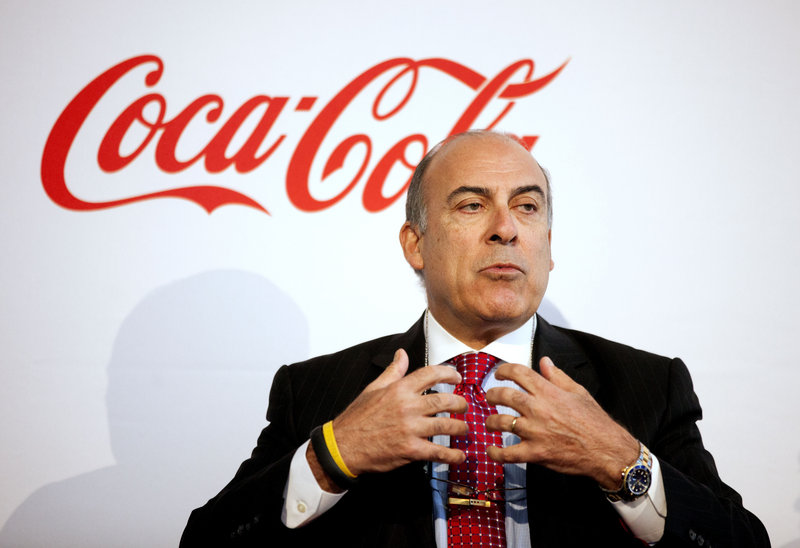ATLANTA – In a sign of how health concerns have shaken the beverage industry, Coca-Cola Co. used a boisterous anniversary celebration Wednesday to pledge to make low-calorie drinks and clearer nutritional information more available around the world.
Facing increasing criticism from consumer advocates and politicians over the link between sugary soft drinks and expanding waistlines, the Atlanta-based beverage giant marked its 127th birthday with a global effort to emphasize healthier drink choices.
The company’s stock has been enjoying a recent surge, thanks to improving international demand and rising sales of noncarbonated drinks in North America.
But beverage companies face a longer-term threat as some health officials, government leaders and consumer advocates link their drinks with an obesity epidemic.
Chief Executive Muhtar Kent said the company would offer low- and no-calorie drinks in every market, provide clear nutritional information on packaging and reaffirm its vow to stop advertising to children younger than 12. These efforts aren’t new in the U.S., but low-calorie alternatives and detailed nutritional information isn’t as available in some emerging overseas markets.
“We’re beginning the next phase of our journey to promote better health and well-being,” Kent said.
One of Kent’s recent concerns involved the move by New York City Mayor Michael Bloomberg, who secured a first-ever cap on the size of soft drinks sold at some stores, though the courts have blocked it.
As legislators in other communities consider a similar move, Coca-Cola has pushed back with a two-minute TV commercial that outlined the company’s efforts to provide healthier drinks and remind viewers that obesity goes beyond soft drinks.
The announcement Wednesday at the World of Coca-Cola in downtown Atlanta sought to build on that strategy with an elaborately staged event that featured prominent politicians and well-known health officials on hand to toast the company for the initiative.
“Industry has the power to communicate and make resources available to encourage people to be more physically active,” said former U.S. Surgeon General David Satcher, who was at the announcement to praise the news. “We have a major problem in this country, and we’ve got to educate our children to make healthy choices.”
The efforts failed to sway critics, who say they amount to lip service that doesn’t meaningfully address obesity. The Center for Science in the Public Interest, which has called for soda taxes, called it a “campaign to sell more Coca-Cola and not a campaign to combat obesity.”
“Besides selling more Coke, the company’s objective is to deflect criticism of sugary drinks and forestall meaningful government action to reduce soda consumption, such as taxes, curbs on serving sizes, and so on,” the center said in a statement, adding that health problems “can’t be advertised away.”
The company said it would cooperate with groups looking “to be part of the solution.”
And the announcement also came with a sweetener for the company’s home state: Coca-Cola pledged $3.8 million to support nutrition education programs and boost access to physical activity programs in Georgia.
The bulk of the money will fund Georgia’s anti-obesity SHAPE program. Only 16 percent of Georgia’s 1 million schoolchildren were able to pass five basic physical fitness tests, and Gov. Nathan Deal said the money would help boost the results.
Send questions/comments to the editors.



Success. Please wait for the page to reload. If the page does not reload within 5 seconds, please refresh the page.
Enter your email and password to access comments.
Hi, to comment on stories you must . This profile is in addition to your subscription and website login.
Already have a commenting profile? .
Invalid username/password.
Please check your email to confirm and complete your registration.
Only subscribers are eligible to post comments. Please subscribe or login first for digital access. Here’s why.
Use the form below to reset your password. When you've submitted your account email, we will send an email with a reset code.